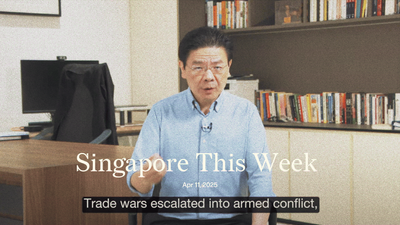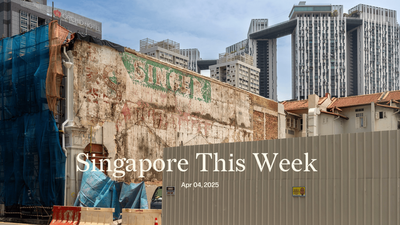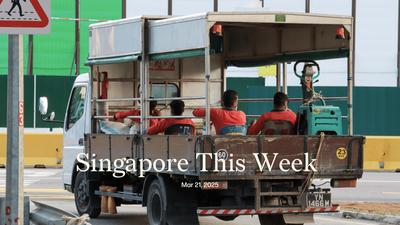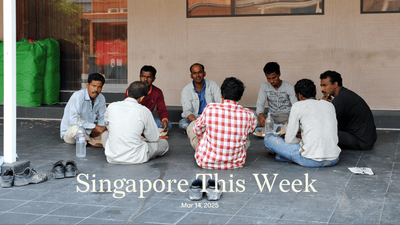Society: Another high for Schooling
Singapore’s sporting establishment was shocked to learn that Joseph Schooling, our first and only Olympic gold medallist, toked up this May in Vietnam (along with fellow swimmer Amanda Lim). The Ministry of Defence (Mindef) had allowed Schooling to disrupt his National Service (NS) to travel to Hanoi for the SEA Games, where he won two golds and a bronze. No more disruptions, says Mindef, which means Schooling will miss the next SEA Games and Asian Games—probably sinking his swimming career. Critics will latch onto this as further proof for why elite sportspeople should not be given NS exemptions. A Straits Times commentary called this his “Tiger Woods moment”. This is overblown. Cannabis may be banned in Singapore, but it’s increasingly tolerated around the world. Given that he tested negative, Schooling broke no Singaporean law. Rumours suggest somebody snitched on him. Schooling has apologised for his “bad judgement”. We should all just jointly move on.
Society: Robot therapy
The Ministry of Education has launched a do-it-yourself mental health check-in portal for educators and non-teaching staff. They can anonymously share concerns with a chatbot, which will then direct them to relevant tips and strategies to manage their mental health. The pandemic has put extra pressure on teachers—over 80 percent surveyed last year said their mental health had suffered due to long work hours. So too their physical health, with 62 percent noting issues like irritability, insomnia and recurring headaches. While the focus on mental health is to be cheered, asking overworked teachers to interact with a chatbot, albeit an increasingly popular platform, may be cause for further stress. Is the chatbot another band-aid fix by a solutions-oriented technocracy? Chan Chun Sing, education minister, also believes that alumni should be doing more to alleviate teachers’ stress. Teachers might cringe, but if alumni actually helped free teachers of their non-teaching demands, it might be welcome. Better still would be smaller class sizes. That would really help Chan achieve his objective: “If the teachers have the sparkle in their eyes, I don't have to worry about the students.”
Society: Driven to despair
The High Court has dismissed all unfair work practice claims made by a former bus driver against SBS Transit (SBST). Chua Qwong Meng’s allegations included that SBST had breached the Employment Act by forcing him to work seven consecutive days before giving him a day off, that it had underpaid him for overtime work, and that it had made him work more than 72 hours of overtime a month, the legal limit, on numerous occasions. In dismissing all claims, the judge noted that the Act allowed for employers to schedule a rest day on any day of the week. It was a reminder that drivers and other low-wage workers could conceivably work up to 12 days without a break. The decision will be binding on 12 other drivers who had filed separate suits. Singapore labour “tripartism”, between the government, (defanged) unions and employers, has resulted in a non-confrontational labour movement. Yet in recent years, spurred by pro-bono lawyers and a sympathetic public—Chua crowdfunded for the case—low-wage workers have grown bolder. In 2012, Singapore saw its first strike in 26 years, by 171 bus drivers at SMRT Corporation, who protested against unsatisfactory wages, living conditions and discrimination based on nationality. Chua may have failed in his suit, but he has probably helped to expose the grossly unequal relationship between employers and low-wage workers.
Arts: Another one bites the dust
Music fans now have one less live performance venue. The Glass Hut, a multidisciplinary creative space, announced that it would be vacating its home at 195 Pearl’s Hill Terrace, because of the management’s “unexplainable wrath” towards its music events. Given an ultimatum—ditch music or go—The Glass Hut chose to go. The decision came just as The Glass Hut was meant to host Interlude, a weekend of up-and-coming Singaporean acts. Though new to the scene, The Glass Hut is now firmly within the tradition of Singaporean music venues forced to shutter prematurely: Kult Kafé, Canvas, and White Label, to name a few. There’s a glimmer of hope though—the team is searching for alternative venues for its workshops, markets and events.
Arts: It’s never too late
The Singapore Literature Prize (SLP), our oldest literary award, celebrated its 30th year last Thursday. In each of the three categories (fiction, poetry and creative non-fiction) there were four winners, one for each official language (English, Chinese, Malay and Tamil). Notable among the 12 winners were Wang Gungwu, a historian, and Suratman Markasan, a literary pioneer, who won in the English and Malay creative non-fiction categories respectively. First-time winners at 91, they are now the joint oldest recipients of the Prize. Jee Leong Koh, a New-York-based poet, was nominated in both the English fiction and English poetry categories, winning the former. Koh has previously said that he would no longer work with the National Arts Council (NAC), a SLP backer, over its censorial nature. Rumours suggested he might reject any prize. Ultimately a friend received it on his behalf, announcing that Koh would be donating his prize money to the Transformative Justice Collective, an activist collective working towards the abolition of the death penalty in Singapore. That’s one way to channel government funds towards abolition.
Arts: The Queer Show 2022
Grey Projects, an independent art space, has announced a different approach to its annual Queer Show. Titled “Post-Repeal: Let’s Think About Us”, the show will be a two-month-long programme that transforms the Grey Projects studio into a community space for “gathering, mutual support, and collective learning”. The Queer Show 2022 will be held jointly with Starch, an artist-run space, which will be presenting “/fam”, a group show engaged with themes of kinship, chosen families, and belonging. The programme at Grey Projects runs from September 7th to November 5th. The exhibition at Starch is on from September 3rd to October 2nd.
Internet culture: Cancel the cancel
Following the repeal of Section 377A, the home affairs and law minister, K Shanmugam, has stated that the government is looking at ways to “ensure that no one will be cancelled for stating their views”. ‘Cancel culture’ gained popularity as a term on social media and is nebulously defined. It could refer to a spectrum of behaviour, from simple criticism of one’s views to doxxing, and in-person harassment. The worry here is that ‘cancel culture’ is a bogeyman marshalled by those in power—including politicians and religious leaders—to shut down fair and honest criticism of their (possibly bigoted) views. In other words, by calling fair criticism ‘cancel culture’, you insulate yourself from it. Shanmugam notably did not attempt to define the term, raising the question of whether the government will propose laws to crack down on online dissent. A range of experts interviewed by TODAY agreed that there’s no need to introduce specific laws to deal with so-called ‘cancel culture’. Shanmugam may think otherwise.
History weekly by Faris Joraimi
One of my favourite anecdotes about Hari Merdeka—August 31st 1957, the day Malaya attained independence from the British—is about its most famous song, “Tanggal 31” (‘The 31st’). Pop icon Sudirman recorded a popular cover in the 80s, but its original singer was Ahmad CB. He was born in 1907 in Medan, grew up in Singapore and considered Malaya his homeland. One widely repeated account claims that Ahmad was in Batam when news broke that day. He quickly sailed to Singapore, then still the capital of Malayan music production, scribbling the lyrics that would fan Malaysian patriotism decades hence. “Tanggal 31” is a rousing tune, with a call-and-response: a chorus shouts “Merdeka!” with Ahmad CB, just like the Malayan nationalists did at their rallies with the masses. (Listen to it here.) Ahmad penned other memorable songs before he died in 1997, including a tribute to Geylang Serai. For some reason, many of the composers that gave Malaya and Singapore our best music came from Sumatra. There was Saiful Bahri from Payakumbuh, who wrote two Malaysian state anthems besides other beautiful songs, and our own Zubir Said, from Bukittinggi.
Note: It’s mostly West Malaysians who celebrate Hari Merdeka. Many East Malaysians (Sabahans and Sarawakians) believe Hari Malaysia, which commemorates the formation of the Malaysian Federation on September 16th 1963, ought to be prioritised. Singapore, of course, separated from the Federation on August 9th 1965.
Business: The best are always welcome
Given troubles elsewhere in the developed world—from geopolitical crises to governance failures exposed by the pandemic—Singapore is an increasingly attractive destination for the world’s plutocrats and talent. Rich Chinese have already been moving here in droves, as this recent piece in The Financial Times makes clear. To smoothen the way for high-earners and other top professionals, Singapore has just announced a new Overseas Networks & Expertise (ONE) Pass. To qualify, one must show prior (or promised) earnings of at least S$30,000 per month, or “outstanding achievements in tech, arts, academia or sports.” While a traditional Employment Pass lasts two years and is tied to an employer, the ONE is for five years and is available even to those without a job. It’s also easier to bring in dependents through the ONE. Over the past decade, competition from immigrants for mid- to upper-mid level jobs has led to a lot of angst among Singaporeans. The exclusive ONE Pass is unlikely to instigate similar professional fears. Indeed, it could make it easier for companies to fill high-level vacancies, and may offer a filip to our local start-up scene (as a related Tech.Pass is designed to do). Agents at Bentley and Sentosa are also likely licking their lips.
Tech: Better financial products for Singapore’s underserved
Can a telco and ride-hailing platform leverage their combined data to improve financial inclusion? This week, Grab and Singtel’s GXS Bank launched its first product: a savings account targeted at underserved individuals, self-employed entrepreneurs and gig economy workers. Earlier this year, the Grab-Singtel consortium won a Malaysian digital banking licence and bought a 32.6 percent stake in PT Bank Fama Bank International to pursue opportunities in Indonesia. It is facing fierce competition from the one other Singapore digital full bank licensee, SeaMoney, which has just doubled its quarterly revenue from the year before to over US$279m (S$389.8m). SeaMoney’s sister companies include Shopee, an e-commerce platform, and Garena, a gaming firm. GXS Bank and SeaMoney will be vying to acquire new banking customers from their respective customer bases.
Tech: The friendly Ninja
If you’ve ordered something online recently, chances are it was dropped off by Ninjavan, a Singapore-based logistics start-up. It delivers more than 2m parcels daily across the region, many through its 80,000 sqft automated hub in Singapore. In the financial year ending June 2021, Ninjavan almost doubled its revenue to US$638.8m (S$891.3m). Nonetheless, the company is still far from profitability, with year-on-year losses narrowing only 15 per cent to US$72.4m (S$101.1m) in 2021. To complicate matters, Ninjavan is now in a significantly more challenging environment: e-commerce purchases have slowed post pandemic, and operating costs have increased due to rising fuel prices following Russia’s invasion of Ukraine. Ninjavan is eyeing a US IPO in 2022-23. But if its financials worsen, shareholders may be in for a late delivery.
If you enjoy Jom’s work, do get a paid subscription today to support independent journalism in Singapore.








